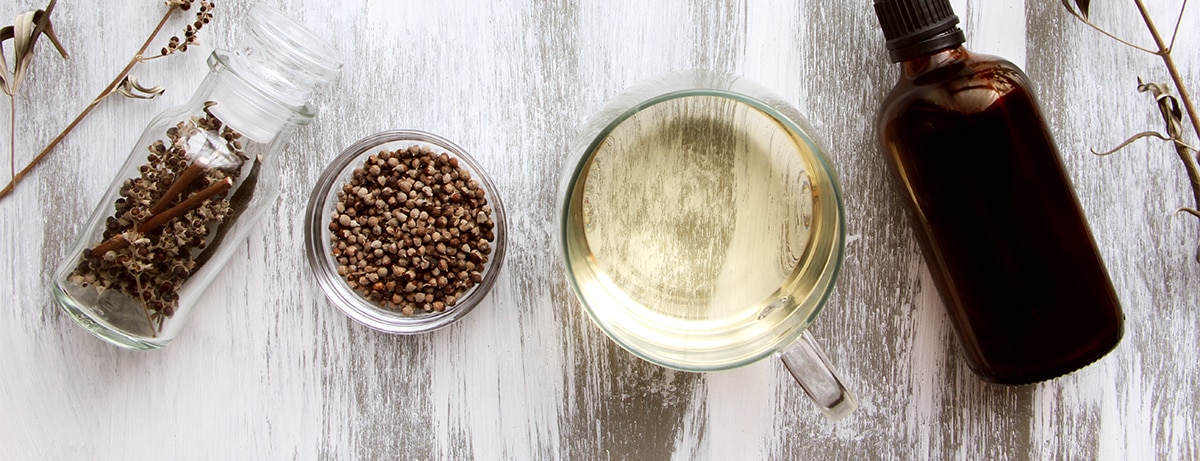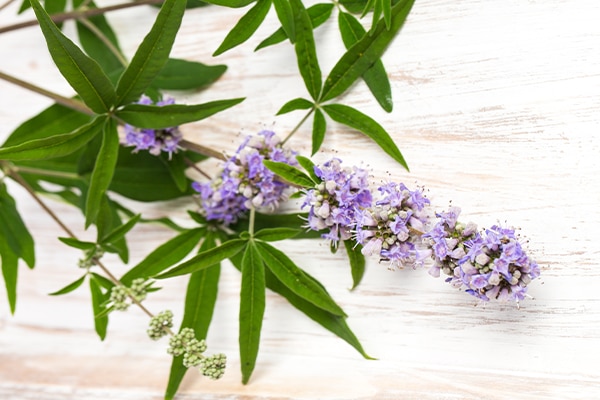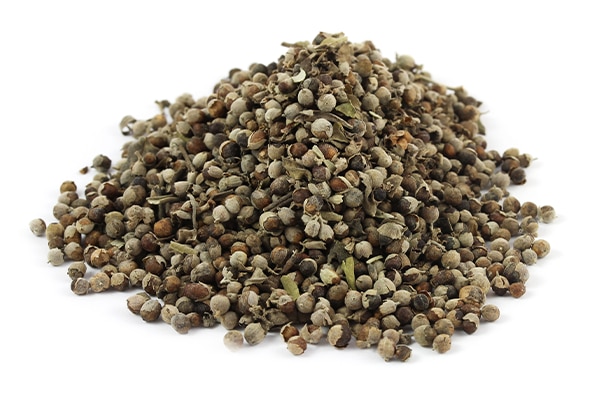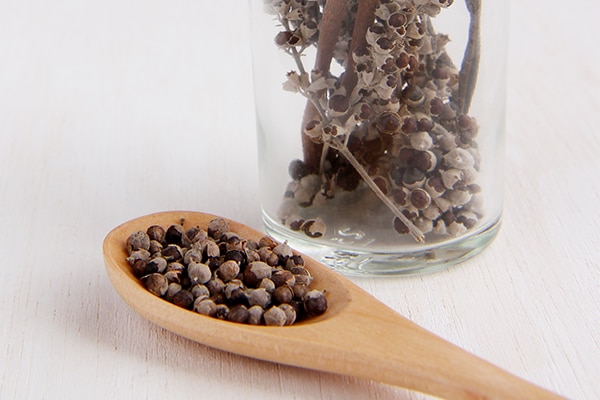20% off £35
Vitex agnus castus (chasteberry): benefits, dosage, side-effects & supplements

Written byBhupesh Panchal

Do you get PMS symptoms every month, including tender breasts or mood swings? Meet your go-to herbal remedy that could help!
Find out all about agnus castus, including what it does, the benefits of taking it and how much you might need.
What is agnus castus?
What is agnus castus?
Agnus castus is a shrub that grows in Mediterranean countries and central Asia.
The plant has been used for centuries to tackle female gynaecological issues and is still taken as a traditional herbal medicine to help relieve symptoms of premenstrual syndrome (PMS), such as irritability, mood swings, headaches, bloating and breast tenderness.1
Agnus castus berries are usually dried out, then made into either a powder (taken as capsules) or a tincture. It can also be used as an essential oil.


Vitex agnus castus is the official name for agnus castus.
Yes! Agnus castus is also known as chasteberry, as eating the seeds was originally believed to reduce libido.2
This shrub grows up to 2.5m tall, with splayed leaves and fragrant, lavender flowers that emerge in Autumn.3
Most people use agnus castus for female hormone-related issues as it is thought to help balance them.
It’s not yet fully understood how agnus castus works, but it’s thought it has an impact on hormone-producing areas of the brain, such as the pituitary gland, which then leads to a reduction in prolactin, a hormone that may be involved in PMS.
Agnus castus is most often taken for PMS, but research shows it may also be helpful for other hormonal conditions including menopause and female fertility issues.4
7 benefits of agnus castus
-
Agnus castus for PMS symptom relief
When the balance of progesterone and oestrogen changes during your menstrual cycle, you may experience the classic symptoms of premenstrual syndrome (PMS) such as irritability and low moods.
A 2012 Iranian study found that agnus castus could offer relief from mild to moderate PMS symptoms, including headaches, depression and bloating,5 while German researchers reported in 2000 that the herb could reduce – and in some cases, entirely stop – PMS symptoms.6
In addition to this, evidence collated by the University of Michigan Health System found that taking vitex once in the morning over several months can help stabilise your hormones and relieve the symptoms of PMS.7
-
Could help soothe tender breasts
Bothered by sore breasts before your period? Doctors say this happens due to hormone changes before your period starts.8 It may be partly down to high levels of the hormone prolactin.
In 2003, a review of studies by the University of Göttingen, Germany, reported that stress in the premenstrual phase of the month can trigger a rise in prolactin.9
But the review also found agnus castus can help normalise prolactin levels and ease breast tenderness.
More recently, a 2012 study from Hamedan University of Medical Science in Iran looked at 128 women with symptoms of PMS, including breast tenderness and fullness, and gave them 40 drops of either agnus castus or a placebo for six days before their period. The women taking agnus castus reported significant improvements in breast tenderness and other symptoms.10
-
Could help ease menopausal symptoms
According to a study published in the Journal of Alternative and Complementary Medicine in 2009, there is enough ‘emerging pharmacological evidence’ to recommend agnus castus for menopause symptom management, particularly the PMS-like symptoms that occur during the perimenopause.11
An earlier 2003 study concluded that applying agnus castus essential oil to the skin could ease symptoms such as hot flushes, night sweats, sleep patterns and irregular periods.12
-
Could help with fertility problems
Agnus castus is often used by herbalists to treat fertility problems. Again, it’s the herb’s hormone-balancing effects that are thought to help.
As agnus castus can normalise progesterone levels, it can be helpful for women whose luteal phase – the second half of the menstrual cycle, after ovulation – is too short to maintain a pregnancy.
Several studies have found that agnus castus can rebalance hormones and lengthen menstrual cycles, regulate periods and even lead to successful pregnancies.13
A study carried out by Medizinische Hochschule, Hamburg, Germany, looked at 52 women with luteal phase defects and gave half of them 20mg of agnus castus for three months, while the other half took a placebo. After this time, the luteal phase normalised in the agnus castus group.14
As it can take a few months to work, be patient – and stop taking it once you get pregnant.
Handpicked content: 7 great ways to boost your fertility naturally
However, most of the research involved supplements that combined agnus castus with other vitamins or herbs, so further studies are needed to isolate its effects.
Handpicked content: What happens in the early days of pregnancy?
-
May help prevent insect bites
Vitex agnus castus could offer some protection against some insects like flies, mosquitos, ticks, head lice and fleas.
One study found that an extract made from agnus castus seeds helped to repel mosquitos, ticks, flies and fleas for around 6 hours.15
Another study found that a spray made from agnus castus and other plant extracts protected the participants from head lice for at least 7 hours.16
More research shows that agnus castus could reduce adult lice reproduction and kill lice larvae.17,18
-
A potential link between agnus castus and PCOS
Polycystic ovary syndrome (PCOS) is one of the most common female hormonal conditions, affecting up to 6-8% of girls and women of reproductive age.
It’s caused by an imbalance of the female sex hormones paired with higher levels of male hormones called androgens. This is because women with PCOS produce more androgens in their ovaries, which then affect the development and release of eggs in the ovulation process.
A review of 33 studies researching the effects of various herbal medicines on the management of PCOS symptoms found angus castus to be effective in improving the symptoms of PCOS.
One animal study found angus castus to be effective in reversing the adverse effects of hormonal imbalance of PCOS.19
-
Could help ease hormone-induced anxiety
Anxiety is a common symptom that women experience due to hormonal changes and fluctuations in the body.
As agnus castus could be effective for easing PMS symptoms, it may also help to reduce hormone-induced anxiety.
One study on 210 women with mastalgia (breast pain caused by hormones) found that when they took vitex agnus castus, their anxiety levels reduced significantly compared to the control group.20
However, more studies are needed to conclude any correlation between PCOS symptom relief and agnus castus.
Agnus castus dosage
How much agnus castus is safe to take?
The European Medicines Agency suggests that 20mg a day of agnus castus is safe to take, to treat PMS.
How long can you take agnus castus for?
You should not take it for more than three months without advice from your GP or a healthcare professional, or if you’re pregnant or breast-feeding.21
Agnus castus side effects
Now you know about its benefits, What are the side-effects of agnus castus?


8 side effects of agnus castus
Although it is likely safe for most people, some known side-effects of agnus castus include:22
Allergic reactions, Swelling, Difficulty breathing, Headaches, Nausea, Stomach aches, Irregular periods, Trouble sleeping & Weight gain
If you experience any of these side effects, stop taking agnus castus and seek medical attention – particularly if you’re having an allergic reaction.
Does agnus castus cause weight gain?
Yes, weight gain is one of the potential side effects of taking agnus castus, but it is not very common.
Who shouldn’t take agnus castus?
Because of the herb’s effect on the pituitary gland, those with a pituitary disorder should not take it without talking to their doctor first.
If you're taking any other hormone medications, such as the contraceptive pill or hormone-replacement therapy (HRT), do not take agnus castus without proper medical advice from your GP or a healthcare professional.23
When should you take vitex agnus castus supplements?
You can take agnus castus supplements in the morning or in the evening – it doesn’t really matter which. Just make sure you take it at roughly the same time every day for best results.
What agnus castus/chasteberry supplements are available?
What agnus castus/chasteberry supplements are available?
You will generally find agnus castus in the following forms:
- Agnus castus drops
- Agnus castus tablets
- Agnus castus liquid
- Agnus castus capsules


The final say
- Agnus castus extract comes from a shrub grown in Mediterranean countries and central Asia
- The plant has been used for centuries to tackle female hormonal issues like easing PMS symptoms and supporting fertility
- You will usually find it in tablet, capsule and liquid form
- Agnus castus is likely safe for most people, but there are a few known side effects like allergic reactions, difficulty breathing and potential weight gain
- People with a pituitary gland disorder or those with hormone medications (like the contraceptive pill) should not take agnus castus without seeking medical advice from a GP or healthcare professional first
- https://www.ema.europa.eu/en/medicines/herbal/agni-casti-fructus
- https://www.ema.europa.eu/documents/herbal-report/final-assessment-report-vitex-agnus-castus-l-fructus-revision-1_en.pdf
- https://www.rhs.org.uk/Plants/Nurseries-Search-Result?query=43844
- https://www.ncbi.nlm.nih.gov/pubmed/15783241
- https://www.ncbi.nlm.nih.gov/pubmed/22359078
- https://www.ncbi.nlm.nih.gov/pubmed/10787228
- http://www.uofmhealth.org/health-library/hn-2181002
- https://www.hopkinsmedicine.org/healthlibrary/conditions/breast_health/mastalgia_breast_pain_85,P00154
- https://www.ncbi.nlm.nih.gov/pubmed/12809367
- https://www.ncbi.nlm.nih.gov/pubmed/22359078
- http://anyflip.com/kfvb/wlzq/basic
- https://eurekamag.com/pdf/004/004384381.pdf
- https://www.healthline.com/nutrition/vitex#womens-reproduction
- https://www.ncbi.nlm.nih.gov/pubmed/8369008
- https://www.ncbi.nlm.nih.gov/pubmed/15682335
- https://www.ncbi.nlm.nih.gov/pubmed/20054562
- https://www.ncbi.nlm.nih.gov/pubmed/18353565
- https://www.ncbi.nlm.nih.gov/pubmed/20054562
- https://ijbcp.com/index.php/ijbcp/article/view/1857
- https://www.researchgate.net/publication/307813918_The_Effects_of_Vitex_Agnus_Castus_and_Vitamin_E_on_Anxiety_in_women_with_Mastalgia_A_Randomized_Clinical_Trial
- https://www.ema.europa.eu/documents/herbal-report/final-assessment-report-vitex-agnus-castus-l-fructus-revision-1_en.pdf
- https://www.ema.europa.eu/en/medicines/herbal/agni-casti-fructus
- https://www.ema.europa.eu/documents/herbal-report/final-assessment-report-vitex-agnus-castus-l-fructus-revision-1_en.pdf
The advice in this article is for information only and should not replace medical care. Please check with your GP or healthcare professional before trying any supplements, treatments or remedies. Food supplements must not be used as a substitute for a varied and balanced diet and a healthy lifestyle.














